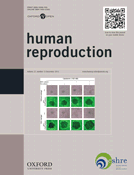
HUMAN REPRODUCTION
Scope & Guideline
Transforming knowledge into practice in human reproduction.
Introduction
Aims and Scopes
- Clinical Aspects of Reproductive Health:
The journal covers a wide range of clinical topics, including infertility treatments, assisted reproductive technologies (ART), and the medical management of reproductive health issues. - Laboratory Techniques and Innovations:
Innovative laboratory methods such as time-lapse imaging, embryo selection techniques, and the application of artificial intelligence in reproductive practices are key focuses, showcasing advancements in embryo assessment and selection. - Endocrinology and Reproductive Physiology:
Research on hormonal influences, ovarian function, and the physiological mechanisms underlying reproduction is a central theme, highlighting the importance of endocrine factors in fertility. - Genetic and Epigenetic Factors:
The journal emphasizes the role of genetic testing, including preimplantation genetic testing (PGT) and the impact of epigenetic modifications on reproductive outcomes. - Public Health and Societal Implications:
Addressing the broader implications of reproductive health, including the social, ethical, and economic aspects of fertility treatments and reproductive choices, is a significant area of focus. - Patient Perspectives and Psychosocial Factors:
Understanding the emotional and psychological dimensions of infertility and reproductive treatments, including patient experiences and decision-making processes, is crucial for improving care practices.
Trending and Emerging
- Artificial Intelligence in Reproductive Medicine:
The integration of AI technologies for embryo assessment, prediction of outcomes, and patient management is rapidly gaining traction, indicating a trend towards automation and precision in reproductive health. - Personalized Medicine Approaches:
There is a noticeable shift towards personalized treatment protocols, such as individualized ovarian stimulation regimens and tailored embryo transfer strategies, reflecting a broader trend in healthcare. - Microbiome Research:
Emerging studies on the role of the endometrial and vaginal microbiome in fertility and reproductive outcomes are becoming increasingly prevalent, suggesting a growing interest in the microbiota's influence on reproductive health. - Non-Invasive Testing Methods:
Innovations in non-invasive testing, including the use of cell-free DNA and metabolomics for predicting embryo viability and implantation potential, highlight a trend towards minimizing invasive procedures in reproductive medicine. - Focus on Psychological and Emotional Well-being:
An increasing number of studies are addressing the psychosocial aspects of infertility and ART, emphasizing the importance of mental health support and patient-centered care in reproductive health services. - Environmental and Lifestyle Factors on Fertility:
Research exploring the impact of environmental exposures, dietary factors, and lifestyle choices on fertility outcomes is gaining momentum, reflecting a holistic approach to reproductive health.
Declining or Waning
- Traditional Fertility Treatments:
As newer technologies and methods (like AI and advanced genetic testing) gain traction, traditional approaches to fertility treatment may be receiving less emphasis in recent publications. - Gender-Specific Fertility Issues:
While gender issues remain important, the focus on male-specific fertility challenges has waned slightly, possibly due to increased awareness and research on broader reproductive health. - Conventional IVF Techniques:
With the rise of personalized and optimized approaches such as DuoStim and advanced embryo selection techniques, conventional IVF methods are being discussed less frequently. - Sociocultural Studies:
Research focusing on sociocultural aspects of reproduction, while still valuable, appears to be less prominent compared to more technical and clinical studies, reflecting a shift towards data-driven research. - Longitudinal Studies:
The frequency of long-term longitudinal studies assessing outcomes post-treatment has decreased, as there is a growing emphasis on immediate clinical outcomes and technological advancements.
Similar Journals
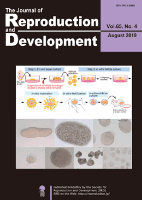
JOURNAL OF REPRODUCTION AND DEVELOPMENT
Unveiling the mysteries of reproduction and development.JOURNAL OF REPRODUCTION AND DEVELOPMENT, published by the SOCIETY REPRODUCTION & DEVELOPMENT-SRD in Japan, is a leading peer-reviewed journal dedicated to advancing the field of reproduction and development in animal sciences. With a notable impact factor reflected in its prestigious Q1 Quartile ranking in Animal Science and Zoology, the journal aims to disseminate cutting-edge research that explores the complexities of reproductive biology, developmental processes, and their implications for agriculture and biodiversity. This journal invites contributions that span multidisciplinary interests, thereby facilitating the integration of scientific knowledge and practical applications. Researchers, professionals, and students can benefit from the insights shared within its pages, as it strives to foster collaboration and innovation in the field. The journal’s comprehensive scope and esteemed reputation, underscored by its Scopus rank of #115 out of 490 in the category, make it an invaluable resource for anyone invested in the study of reproduction and development.

Reproductive Medicine
Empowering Professionals through Open Access InsightsReproductive Medicine is an esteemed open-access journal published by MDPI, focusing on the latest research and advances in reproductive health, fertility, and assisted reproductive technologies. With its E-ISSN of 2673-3897, the journal aims to provide a platform for researchers, clinicians, and healthcare professionals to disseminate their findings, share innovative practices, and engage in scholarly discourse. Situated in Basel, Switzerland, Reproductive Medicine emphasizes a multidisciplinary approach, exploring biological, clinical, and psychological aspects of reproductive health. Although the journal is in the early stages of establishing metrics such as H-index and Scopus rankings, its open-access model enhances accessibility, allowing for a broad dissemination of knowledge. Committed to fostering advancements in the field, Reproductive Medicine is essential for those seeking to stay at the forefront of reproductive health research.
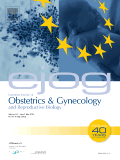
European Journal of Obstetrics & Gynecology and Reproductive Biology
Delivering Insights for a Healthier FutureWelcome to the European Journal of Obstetrics & Gynecology and Reproductive Biology, a premier publication dedicated to advancing the fields of obstetrics, gynecology, and reproductive medicine. Published by Elsevier, this journal has been a vital resource since its inception in 1971, continuing to provide high-quality, peer-reviewed research through 2024 and beyond. With an impressive impact factor and recognized in the Q2 quartile for both obstetrics and gynecology, as well as reproductive medicine, it ranks among the top journals in its field, being positioned at #59 out of 209 in Obstetrics and Gynecology and #29 out of 90 in Reproductive Medicine. Though not currently an Open Access journal, it remains committed to disseminating valuable findings to enhance clinical practice and facilitate further research. Researchers, professionals, and students can expect insightful articles, comprehensive reviews, and pioneering studies that significantly impact women's health and reproductive biology.

Reproductive Biology and Endocrinology
Driving Discoveries in Endocrine Mechanisms and Reproductive HealthReproductive Biology and Endocrinology, published by BMC, is a distinguished open-access journal established in 2003, catering to researchers and professionals in the interdisciplinary fields of reproductive biology, endocrinology, and related biomedical sciences. With a notable impact in 2023, the journal has achieved Q1 rankings in Obstetrics and Gynecology, Reproductive Medicine, and Endocrinology, alongside a Q2 ranking in Developmental Biology, establishing itself as a pivotal source of high-quality research and insights. The journal's commitment to freely accessible research promotes knowledge dissemination across its domains, which is crucial for advancing understanding of reproductive health and endocrine mechanisms. With a robust Scopus ranking showcasing its relevance—17th out of 209 in Obstetrics and Gynecology, and 8th out of 90 in Reproductive Medicine—it serves as an essential resource for academics and clinicians alike, facilitating innovative research and fostering collaboration within the global scientific community.
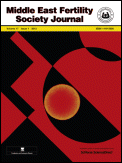
Middle East Fertility Society Journal
Connecting practitioners and researchers in reproductive medicine.Middle East Fertility Society Journal is a premier open-access publication established in 1996 that caters to the fields of Obstetrics and Gynecology as well as Reproductive Medicine. Published by SPRINGER in Egypt, this journal has made significant strides in disseminating high-quality research and advancements in reproductive health, achieving a 2023 Scopus rank of #102 in Obstetrics and Gynecology and #47 in Reproductive Medicine, placing it in the 51st and 48th percentiles respectively. With an aim to foster collaboration and innovation in the fertility sector, it welcomes researchers and practitioners to share their findings and insights, contributing to the global discourse on reproductive issues. As an open-access journal since 2010, it ensures that the latest research is readily available to a broad audience, enhancing accessibility and knowledge transfer in the vital area of reproductive health.

Reproductive and Developmental Medicine
Empowering research for a healthier future in reproduction.Reproductive and Developmental Medicine is a pioneering open-access journal dedicated to advancing knowledge in the fields of reproductive medicine and developmental biology. Published by LIPPINCOTT WILLIAMS & WILKINS, the journal serves as a platform for researchers, clinicians, and graduate students alike, fostering collaboration and dissemination of innovative research findings. With an ISSN of 2096-2924 and E-ISSN 2589-8728, it has established a significant presence in the academic community since its inception in 2017. The journal is indexed in Scopus and achieved a category quartile ranking of Q3 in Obstetrics and Gynecology and Q4 in Reproductive Medicine as of 2023, highlighting its importance as a resource for cutting-edge studies and reviews in these vital areas. The journal's open-access model ensures that research is readily available to scholars and practitioners worldwide, thus enhancing the global discourse in reproductive health and development. This makes Reproductive and Developmental Medicine an invaluable resource for those dedicated to improving outcomes in obstetrics, gynecology, and reproductive health.

THERIOGENOLOGY
Exploring the frontiers of reproductive physiology and biotechnology.THERIOGENOLOGY is a prestigious academic journal published by Elsevier Science Inc, dedicated to the field of veterinary reproduction and animal science. With an impressive impact factor and recognized as a Q1 journal in various categories including Animal Science and Zoology, Equine, Food Animals, and Small Animals, THERIOGENOLOGY has established itself as a vital resource for researchers, practitioners, and students alike. Founded in 1974, the journal covers a broad spectrum of topics related to reproductive physiology, biotechnology, and the health management of food and companion animals. Although it does not currently offer open access, researchers can benefit from its comprehensive articles and reviews that push the boundaries of knowledge in veterinary science. With a significant placement in the Scopus rankings, ranking #1 in multiple veterinary categories, THERIOGENOLOGY serves as an essential platform for advancing the understanding of reproductive strategies and practices, thereby contributing directly to the fields of animal husbandry and veterinary medicine.
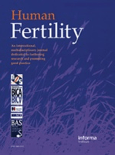
Human Fertility
Transforming Obstetrics and Gynecology through EvidenceHuman Fertility, published by Taylor & Francis Ltd, is a key academic journal that serves the dynamic fields of medicine, obstetrics and gynecology, and reproductive medicine. Established in 1998 and with converged content extending to 2024, the journal holds a notable Q2 ranking in its respective categories, highlighting its influence and scholarly contributions to current research and practice. With an ISSN of 1464-7273 and an E-ISSN of 1742-8149, it rigorously disseminates studies, reviews, and advancements in human fertility, particularly emphasizing evidence-based practices and innovative techniques. Despite its traditional subscription model, the journal remains vital for researchers, healthcare professionals, and students seeking to foster advancements in reproductive health. Its articles are pivotal in addressing the multifaceted challenges faced in reproductive health and guiding future research trajectories.

Reproductive Medicine and Biology
Innovating insights in reproductive medicine and biology.Reproductive Medicine and Biology, an esteemed journal published by WILEY, stands at the forefront of advancements in the field of reproductive health and associated biological sciences. With an impact factor that underscores its relevance—ranking in Q1 for Reproductive Medicine and Q3 in Cell Biology—this journal is distinguished by its commitment to disseminating high-quality, peer-reviewed research since its transition to Open Access in 2002. Based in Japan, the journal caters to a global audience, providing vital insights into reproductive biology, therapeutics, and innovative practices. With Scopus rankings placing it at #22 out of 90 in Reproductive Medicine and a commendable percentile ranking, Reproductive Medicine and Biology aims to foster dialogue and knowledge transfer among researchers, professionals, and students, paving the way for breakthroughs in understanding reproductive health.
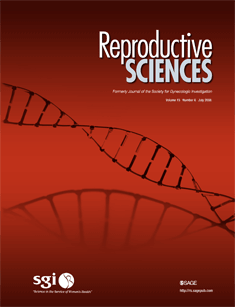
Reproductive Sciences
Exploring the Frontiers of Reproductive SciencesReproductive Sciences is a premier journal published by SPRINGER HEIDELBERG, dedicated to the field of obstetrics and gynecology. With its ISSN 1933-7191 and E-ISSN 1933-7205, the journal has established itself as a leading source of high-quality research and clinical insights since its inception in 2007, and continues to converge its scope into 2024. Currently ranked in the Q1 category for obstetrics and gynecology, it holds the 43rd position among 209 journals in the Scopus rankings, underscoring its influence and relevance within the medical community. This journal is particularly dedicated to advancing knowledge in reproductive health, providing a platform for innovative research and clinical practices through both traditional and open access options. Located in Switzerland with an address in Heidelberg, Germany, Reproductive Sciences is not just a publication; it is a vital resource for researchers, professionals, and students seeking to make impactful contributions to the field of reproductive health.